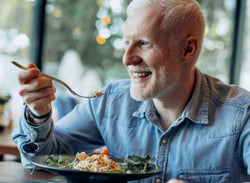

Theme: Showcasing diverse roles in dietetics
Introduction:
Gemma is a Registered Dietitian and she currently works as a Nutrition Projects Manager at AYMES, responsible for overseeing patient acceptability studies. Prior to this, Gemma worked within the NHS for 9 years, both in clinical and research roles. As a Research Dietitian, she developed and implemented a pilot project for managing adult malnutrition in GP practice, which was highly commended by the Health Service Journal.
Welcome Gemma, thanks for joining us during Dietitian’s Week! Please tell us a bit about yourself?
Thanks for having me Harriet! I’m currently sitting in the garden in the gorgeous sunshine - which I’ve been so grateful for during this lockdown period, especially as right now I had planned on being in Croatia. I think I was bitten by the travel bug really early on, probably because I spent most of my childhood growing up abroad, living in Japan, Hong Kong and Australia, before returning to the UK. If I’m not travelling, I love pottering in the garden and this year (thanks to being homebound for the past few months) my fruit and veg crop is looking pretty good - although not quite self-sufficient yet!
What led to your interest in nutrition and dietetics?
The simple answer is my love and interest for food and health, but actually there’s more of a personal story. Halfway through my undergraduate degree I started to consider what I might do once I graduate. My dad was then diagnosed with cancer which led him to seeing a Dietitian for nutrition support all the way through until he was cured. Until then, I’d never actually heard of, or realised what a Dietitian did. His interaction with a particular Dietitian sparked my interest in pursuing a career in dietetics, as I realised I could combine my love and interest for both food and health and hopefully make a positive difference to people’s lives.
Where did you complete your dietetic degree and clinical placements?
Having already completed an undergraduate degree in Physiology I applied for a Post Graduate Diploma in Dietetics at Leeds Metropolitan University (as it was known at the time!) My 3 clinical placements were mainly acute based and took me all over the North East of England - A at The Friarage Hospital in Northallerton, B across Barnsley and C at The Queen Elizabeth Hospital in Gateshead.
Could you tell us about your clinical role(s) in the NHS? Which specialities did you work within?
I spent the entirety of my career working as a Clinical Dietitian in an acute hospital setting. After completing my band 5 rotations, I spent time working in Lower GI Surgery and Critical Care before moving onto becoming an Oncology Dietitian. I particularly enjoyed the artificial feeding aspect of my role as well as being able to see patients throughout their treatment journey.
What did your role as a Research Dietitian involve?
I was really fortunate to have been given a secondment opportunity to work as a Research Dietitian after my hospital was approached by a medical nutrition company. They were seeking another site to take part in a multi-centre randomised control trial, looking into different nutritional care strategies post hospital discharge. During this trial I worked as a primary investigator, recruiting patients and collecting and analysing data. This gave me a real insight into the practicalities of running a large trial as well as the confidence and experience in clinical research. Once this trial ended, we continued to work in collaboration, this time on a local pilot project, evaluating nutritional management in the community and then implementing the malnutrition pathway. This is one of the highlights of my career as the project was highly commended by the Health Service Journal and has since been published in The Journal of Nutrition, Health and Aging.
What led to you working in the medical nutrition industry?
Having had the secondment opportunity and experience of working with a medical nutrition company whilst still in the NHS, it seemed like a natural move to make.
You’re currently working as a Nutrition Projects Manager at AYMES. What does your role entail?
My main role is setting up and overseeing patient acceptability studies. This involves obtaining ethical approval for each study, working with Dietetic Departments in the NHS who recruit patients onto the studies and collect data and then once the study is complete, I compile the results into a report for submission to the Advisory Committee on Borderline Substances (ACBS). Alongside this, I work closely with the marketing and sales teams to provide support with nutritional queries, product training and producing materials.
What are patient acceptability studies?
The purpose of an acceptability study is to rigorously test and confirm that a nutritional product has been found to be acceptable to patients for whom the product is intended. Acceptability studies are a requirement of the ACBS and the outcomes of such a study can include the following: gastro-intestinal tolerance, palatability and compliance.
Could you take us through a typical day of work?
No 2 days are the same at AYMES which is one of the reasons I enjoy my role as much as I do. I typically start my day at around 8:30am whereby I do a little admin, plan my diary and arrange future meetings. Today, there’s a marketing advert that needs regulatory approval, so I spend time reviewing the nutrition and health claims to ensure compliance. If it’s not a marketing advert, it may be a product label, social media post or other external resource that needs checking. Next, I have a product development call which includes colleagues from regulatory, marketing and logistics to discuss product innovation and renovation. I am often glued to my desk, so at lunchtime I like to go for a run or walk - which gets me some way in achieving my 10,000 steps a day! After lunch I have a Zoom meeting scheduled with a Dietitian to have a catch up about an acceptability study that is currently running. I’m then onto the next meeting of the day, this time an internal training session for the sales team. Part of my role is to provide ongoing training to the sales team so that they are always able to achieve the highest standard of product knowledge. With no further meetings scheduled I spend the rest of the afternoon working on a study protocol for our next acceptability study. At AYMES, we all work from home and one of the luxuries of this is that there is no commute at the end (or start) of the day!
What do you most enjoy about your job at AYMES?
I love the fact my role enables me to see projects through to completion. From being involved in new product innovation through to launching that product is really satisfying. I also love how varied my days are and that stems from the flexibility I’m given in managing my own diary.
How do you maintain your CPD as a dietitian working in industry?
Maintaining your HCPC registration is one of the things that might seem a bit daunting when in industry, however, there are always opportunities to learn and develop your skills and knowledge. Although my scope of practice has changed somewhat, I am able to maintain my CPD through an array of different things, for example, attending conferences, enrolling on courses relevant to my role and obtaining feedback from training sessions. In fact I recently got audited in the cycle of HCPC audits and it was remarkably easy to evidence how I was able to meet the standards. Keeping an up to date professional portfolio really helps me to track my CPD.
What advice would you offer to other dietitians who are keen to work in the medical nutrition industry?
There are so many transferable skills that you can bring from a clinical role into industry, from planning and time management through to flexibility and team working. My top tips for others who are keen to work in the medical nutrition industry are:
- Clinical experience is invaluable and forms the foundation for working in this industry.
- Take advantage of industry related research opportunities within your NHS role. It may be that you need to seek them out yourself, be inquisitive.
- Take a communication skills course; to help increase your confidence in taking to the stage to defend sensible nutrition.
- Develop an insight into the world of sales and marketing; this will demonstrate that you’re interested in the growth of the industry.
- Keep up to date with topical issues in nutrition; know what’s ‘trending’ and have an educated opinion on whether it deserves the air-time or not.















